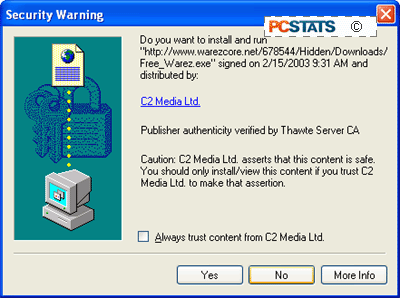"Browser hijackers": A very noticeable and
annoying type of program that changes your browser homepage setting to one of its choosing, and generally includes a small executable file that will run on start up, ensuring that it keeps coming back. Technically this is not spyware, since it does not generally send any information out, but can be included under the same umbrella term. Browser Hijackers are typically Activex controls triggered by visiting a specific URL. Some notable hijackers from recent history are xupiter.com and lop.com (and no, we don't recommend you try those links out).
"Scumware/thiefware": Another vague category,
(named originally by affected webmasters, see www.scumware.com and www.thiefware.com ) containing the occasional forays made by adware providers into the more potentially lucrative territory of attempting to divert advertising revenue from other websites to themselves, using 'contextual advertising' among other methods.
It hit a peak in 2001-2002, with webmasters decrying the existence of spyware bundled with popular applications like Kazaa, Limewire and Morpheus that could alter the ID tags attached to advertising on a website, redirecting and effectively stealing the commission. Widespread protest soon curbed this practice, as it did the Gator Corporation's attempt to redirect advertising revenue by placing its own popup adds directly over the banner ads on websites.
Gator soon reverted to using non-strategically placed ads, and the major Peer
to peer file-sharing companies removed or altered the offending software from
their products. The current focus of webmasters' ire is companies who market
client side 'contextual advertising' software. The idea of this is that the
software, once installed, will superimpose its own hyperlinks on top of the text
of any website you might be visiting, or place pop-up ad windows overlaying the
site window, triggered by the content of the text or the URL you are visiting.
The targets of these links or pop-ups will be companies that advertise
through the makers of the software, of course. Essentially, the software is
parasitically attaching its own advertising to websites and diluting the
advertising revenues they receive. Companies producing contextual advertising
software include eZula Inc. (www.ezula.com), WhenU (www.whenu.com) and the Gator
corporation (www.gator.com)
What can you do about
spyware?
As you have probably realized by now, there are many different ways in which spyware can manifest itself on your computer. In many cases, it may not be at all obvious that your system and your privacy are being
compromised. To safeguard yourself against unwanted software, first and foremost read the fine print. The majority of spyware applications attempt to install themselves either from security permission windows such as this one,

or as 'opt-out' components of the installation process of other software. 'Opt-out' meaning that the software will be installed by default, and you must specifically request during the install process that it not be added. Both can be easily avoided if you are diligent about reading screens and licenses before you click 'ok'.

